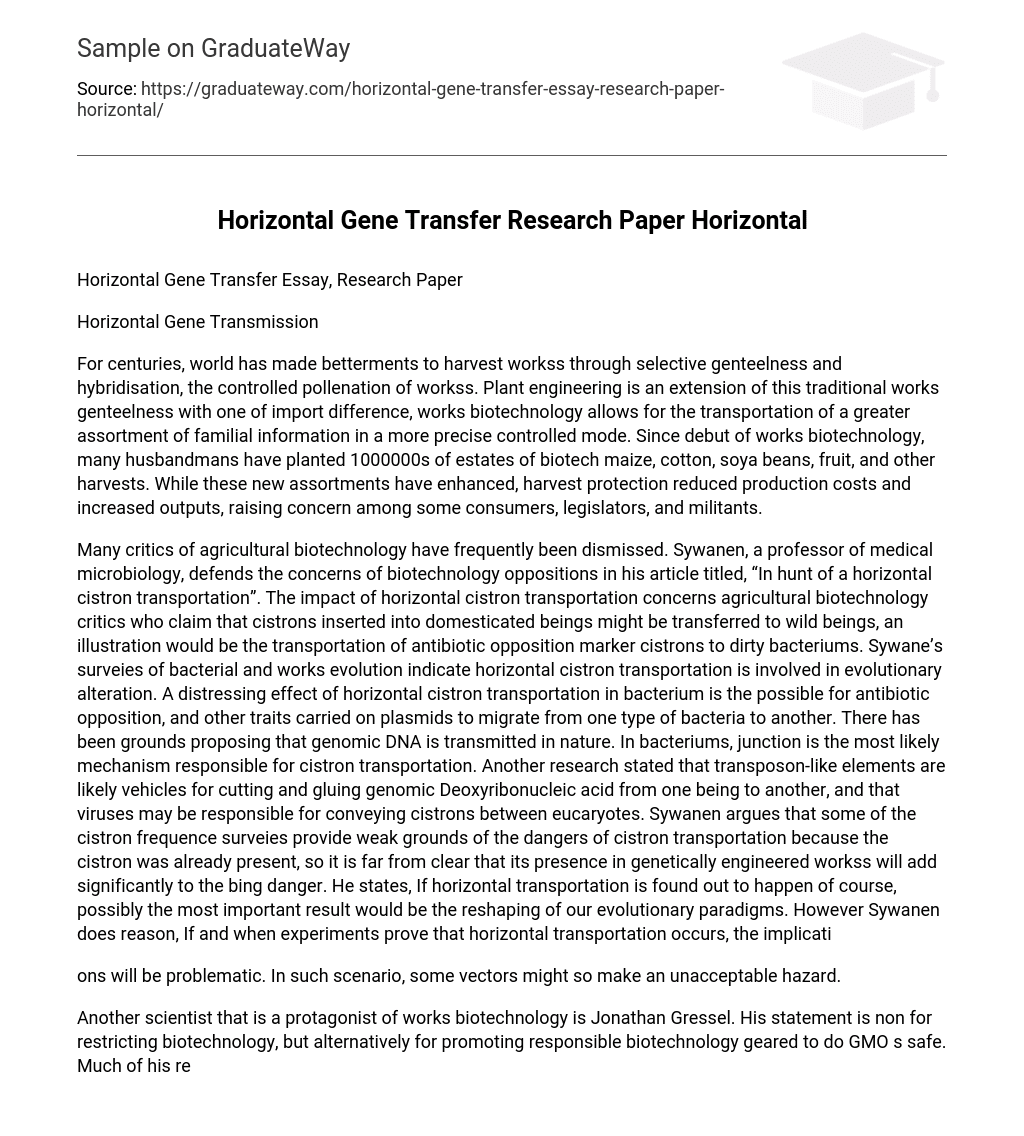For centuries, world has made betterments to harvest workss through selective genteelness and hybridisation, the controlled pollenation of workss. Plant engineering is an extension of this traditional works genteelness with one of import difference, works biotechnology allows for the transportation of a greater assortment of familial information in a more precise controlled mode. Since debut of works biotechnology, many husbandmans have planted 1000000s of estates of biotech maize, cotton, soya beans, fruit, and other harvests. While these new assortments have enhanced, harvest protection reduced production costs and increased outputs, raising concern among some consumers, legislators, and militants.
Many critics of agricultural biotechnology have frequently been dismissed. Sywanen, a professor of medical microbiology, defends the concerns of biotechnology oppositions in his article titled, “In hunt of a horizontal cistron transportation”. The impact of horizontal cistron transportation concerns agricultural biotechnology critics who claim that cistrons inserted into domesticated beings might be transferred to wild beings, an illustration would be the transportation of antibiotic opposition marker cistrons to dirty bacteriums. Sywane’s surveies of bacterial and works evolution indicate horizontal cistron transportation is involved in evolutionary alteration. A distressing effect of horizontal cistron transportation in bacterium is the possible for antibiotic opposition, and other traits carried on plasmids to migrate from one type of bacteria to another. There has been grounds proposing that genomic DNA is transmitted in nature. In bacteriums, junction is the most likely mechanism responsible for cistron transportation. Another research stated that transposon-like elements are likely vehicles for cutting and gluing genomic Deoxyribonucleic acid from one being to another, and that viruses may be responsible for conveying cistrons between eucaryotes. Sywanen argues that some of the cistron frequence surveies provide weak grounds of the dangers of cistron transportation because the cistron was already present, so it is far from clear that its presence in genetically engineered workss will add significantly to the bing danger. He states, If horizontal transportation is found out to happen of course, possibly the most important result would be the reshaping of our evolutionary paradigms. However Sywanen does reason, If and when experiments prove that horizontal transportation occurs, the implicati
ons will be problematic. In such scenario, some vectors might so make an unacceptable hazard.
Another scientist that is a protagonist of works biotechnology is Jonathan Gressel. His statement is non for restricting biotechnology, but alternatively for promoting responsible biotechnology geared to do GMO s safe. Much of his research has to make with weedkiller immune harvests. Herbicide usage may take to unreal choice of weedkiller immune weeds due to the generative advantage on weeds possessing natural weedkiller immune cistrons. Encouragement of superweed development by unreal choice is non the lone statement built against utilizing weedkiller immune harvests. Gressel is concerned that transgenic harvests may crossbreed with nearby weeds. Proposing transgenic traits can be horizontally transferred to wild relations of domesticated workss. Gressel criticizes GMO hazard analyses that ignore the public-service corporation of GE engineering designed to forestall cistron transportation. He states that cistron transportation could be prevented by utilizing tandem concepts, the piggybacking of cistrons that affect sprouting by changing seed quiescence, maturation, and airing, with cistrons for the coveted trait in the concept. Some other schemes include adding traits that cause shadowing, inhibit flower production, prevent ripening, or bring on pollen asepsis. For case, an antibolting trait will work good to forestall the transmittal of cistrons in biennials such as chou. Gressel notes that tandem concepts can besides be used for farther development of harvests transporting traits for insect opposition and enhanced nutritionary value.
In the other manus, some groups use grounds of horizontal cistron transportation as evidences to protest the continued cultivation of transgenic harvests. They argue that wild works populations are being genetically polluted with traits non usually found in the population, and that may harm wild populations by doing extinction of the species, development of plague resistant workss and loss of economically utile allelomorphs. Several European Governments are censoring the usage of genetically modified harvests to forestall all of these results to happen.
For a decision, I feel that the protagonists of horizontal cistron transportation have the strongest statement. Horizontal cistron transportation allows workss breeders to develop harvests with specific good traits. Many of these good traits in new works assortments fight works plagues that can be lay waste toing to harvests and others provide quality betterments.





